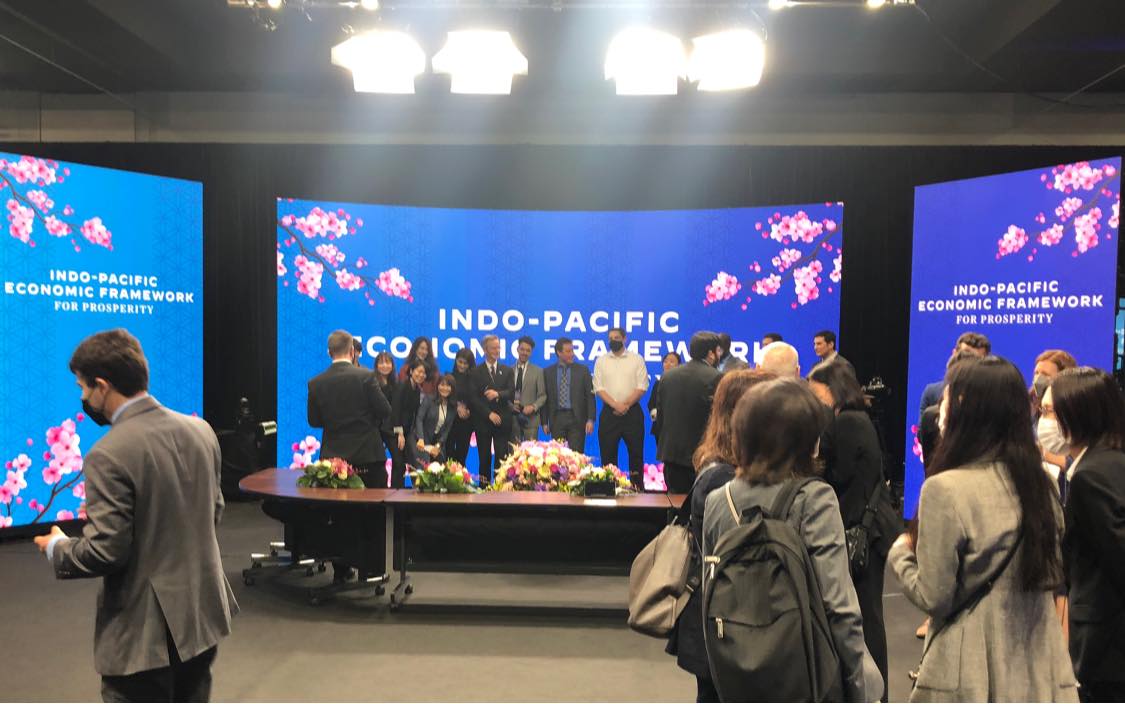Demanding a transparent and participatory process in any Indo-Pacific Economic Framework (IPEF) negotiations
8 September 2022
Demanding a transparent and participatory process in any Indo-Pacific Economic Framework (IPEF) negotiations
To leaders of countries participating in negotiations on the Indo-Pacific Economic Framework :
After decades of living with the consequences of Free Trade Agreements (FTAs) that were negotiated in secret for the benefit of rich countries’ corporate interests, we call for an urgent departure from the status quo. The need for another trade agreement in the region has not been established. If countries choose to move forward with Indo-Pacific Economic Framework (IPEF) talks, they must be based on a new model that prioritizes the interests of working people in all countries, as well as the environment, consumers, family farmers and indigenous peoples instead of just big corporations.
A transparent and participatory negotiating process is critical to ensuring the best possible outcomes from any IPEF or other future trade negotiations.
The novel “a la carte” nature of the four-pillared IPEF negotiations raises particular process concerns. It is critical that strong, enforceable labor rights be both established in law and implemented in practice before an agreement with respect to any of the proposed pillars is allowed to go into effect. This is likewise true on issues of climate, data privacy, consumer safety, indigenous rights, and other public interest provisions.
Ensuring that constituencies and civil society organizations working on these issues have ongoing access to the latest IPEF texts and opportunities for ongoing input with negotiators is crucial.
Toward this end, it is essential for proposals, negotiating texts and related documents to be shared publicly in advance of each negotiating round. IPEF negotiations need to be announced with sufficient time to ensure broad public stakeholder engagement and interactions with negotiators from each nation. All proposals, related materials and any consolidated texts must also be quickly published after each negotiating round so that the public can review and comment on the latest proposals while there is still opportunity to make real changes.
IPEF cannot replicate the unacceptable process or substance of the Trans-Pacific Partnership (TPP), including the secrecy pact that would keep key background documents hidden for years after the negotiations ended. One of the fundamental reasons why the TPP became so unpopular was that it was negotiated under the influence of hundreds of corporate advisors while the public, press, and legislative bodies were locked out. Terms needed for the deal to benefit working people were traded away in favor of special protections for the corporate interests that had access.
In sum, to achieve a needed overhaul of existing international trade policy in IPEF and other international economic frameworks, the processes for negotiating a potential agreement must be transparent and participatory — the complete opposite of the opaque and corporate-dominated processes that produced the FTAs of the past. Civil society organizations, legislative bodies, and the people of potential IPEF countries must be invited to help formulate positions and comment on draft proposals throughout the entire course of the negotiations.
Sincerely,
Development Alternatives with Women for a New Era (DAWN) (International)
APCASO (Regional)
Health Action International Asia Pacific (Regional)
Pacific Network on Globalisation (Regional)
Public Services International (PSI) - Asia Pacific (Regional)
Australian Fair Trade and Investment Network (Australia)
Aid/Watch (Australia)
Australian Arts Trust (Australia)
Australian Services Union (Australia)
Conservation Council of SA (Australia)
GeneEthics (Australia)
Institute of Ecological Agriculture (Australia)
Margaret River Regional Environment Centre (Australia)
Maritime Union of Australia Victoria Branch (Australia)
Missionary Society of St Columban (Australia)
NSW Nurses and Midwives’ Association (Australia)
Public Health Association of Australia (Australia)
SEARCH Foundation (Australia)
Sutherland Shire Environment Centre (Australia)
Vintage Reds (Australia)
Diverse Voices and Acvtion (DIVA) for Equality (Fiji)
Fiji Women’s Rights Movement (Fiji)
IT for Change (India)
Indonesia AIDS Coalition (Indonesia)
Indonesia for Global Justice (IGJ) (Indonesia)
People’s Action Against TPP (Japan)
Center for Health and Social Change (Korea, Republic of)
Korean Pharmacists for Democratic Society (Korea, Republic of)
Korean Federation Medical Groups for Health Rights(Association of Korea Doctors for health rights, Association of Physicians for Humanism, Korean Dentist’s Association for Healthy Society, Korean Nurses association for health rights, Korean Pharmacists for Democratic Society, Solidarity for worker’s health) (Korea, Republic of)
People’s Health Institute (PHI) (Korea, Republic of)
People’s Health Movement (PHM) Korea (Korea, Republic of)
Campaign Against Foreign Control of Aotearoa (New Zealand)
FIRST Union (New Zealand)
It’s Our Future (New Zealand)
Protect Our Waters, and MeWe- Te Ao (New Zealand)
Russell Pierce (New Zealand)
te riroriro (New Zealand)
Te Rongo mauri (New Zealand)
TPP-free Manawatū (New Zealand)
Whenua Holdings Waikato (New Zealand)
Citizens Trade Campaign (USA)
Institute for Agriculture and Trade Policy (USA)
Public Citizen (USA)
Trade Justice Education Fund (USA)






